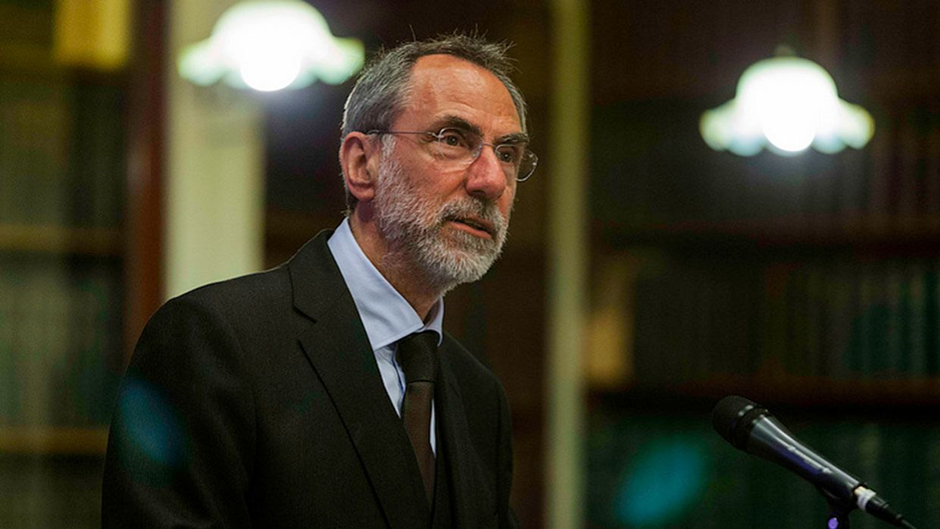The Cultures of Knowledge community has been shocked and saddened to learn of the sudden and unexpected death of Professor Richard Sharpe, FBA, FSA, FRHistS, Hon. MRIA, on 21 March 2020 at the age of only 66.
The obituaries and tributes that have appeared in The Guardian, at Wadham College, and at the History Faculty, where Richard was Professor of Diplomatic, reveal how fortunate our project was to benefit from the guidance of a scholar of such extraordinary distinction. His international renown is reflected in his election as Fellow of the British Academy in 2003, as Honorary Member of the Royal Irish Academy in 2018, and as Corresponding Fellow of the Medieval Academy of America in 2020. The range of his expertise is suggested by some of the major projects in which he was involved: the Dictionary of Medieval Latin from British Sources which he helped to edit between 1981 and 1990, a monumental work on Medieval Irish Saints’ Lives, his general editorship for the British Academy of the Corpus of British Medieval Library Catalogues, which now comprises eighteen of a planned twenty-four volumes; and his direction of the Mellon-funded digital project Medieval Libraries of Great Britain.
Yet these monumental undertakings far from exhausted the range and depth of his scholarly production. As a former graduate student wrote of Richard in the Wadham obituary, ‘The volume and versatility of his research were nothing short of mystifying. … Richard blended in perfectly among experts in every field that he mastered, but only a few of his followers seemed to be aware of the full range of his versatility, and fewer still possessed the intellectual stamina to be able to keep up with the flow of contributions across fields.’
Cultures of Knowledge was one in this mystifying range of supplementary projects, which spiralled off in all directions from his core concerns. A longstanding member of the project’s Steering Committee, Richard exercised a formative influence over the enterprise in its crucial first phase. Each of his main contributions was characteristic of different aspects of the man.
Most palpable, perhaps, was his recruitment of the first major dataset not anticipated in the original bid to the Andrew W. Mellon Foundation: a catalogue and full transcription of the correspondence of Edward Lhwyd FRS, the second Keeper of Oxford’s Ashmolean Museum and an important naturalist, archaeologist, and Celtic linguist. Building on a lifetime’s work by Dr Brynley F. Roberts, the Lhwyd catalogue was compiled and the transcriptions polished by Helen Watt who worked under the supervision of Richard and his colleague at the Centre for Advanced Welsh and Celtic Studies at the University of Wales, Professor Dafydd Johnston.
It was perfectly evident that the correspondence of a pioneering Welsh philologist must have been tangential to Richard’s core concerns, but even more mystifying was his immersion within the oceans of learned correspondence which surrounded Lhwyd. When digitization began of what was known as the Bodleian’s ‘Index of Literary Correspondence‘, this chest of file cards was tucked in corner of the Selden End of Duke Humfrey’s Library, unknown to many but consulted on a frequent basis by Richard. He knew these cards intimately and his expertise was invaluable throughout the disambiguation and reconciliation process required to combine the dataset with EMLO’s six pilot individual correspondences. Indeed, it was a favourite tease to remark that one or two of the precise handwritten corrections spotted on the cards might perhaps have come from his pencil. His response was to roll his eyes, look to the ceiling, shrug his shoulders, and laugh. Helping to untangle specific problems with individual letter records gradually grew into something still more fundamental: Richard’s meticulous attention to detail was indispensable to the project of refining and implementing the EMLO data model as a whole.
Richard’s advice to the project team concerning early modern people and places continued for more than a decade into the weeks just prior to his death. His office was situated in Oxford’s Old Indian Institute, and after he took up residence there once again following a temporary sojourn as our immediate neighbour in the History Faculty, he continued to visit—always unannounced. On each occasion he would deliver a detailed account of his current and wide-ranging work before homing in on what he found in progress across the EMLO desks. On what turned out to be the last of his unannounced visits, Richard inspected the disambiguation work being conducted on the correspondence to be found in the Stuart State Papers, offered to send a ‘list of people for whom an eye should be kept open’ on his behalf, reviewed plans for future work on Bodleian material, and undertook to write introductory pages for, amongst others, Roderick O Flaherty (whose correspondence he published in his meticulous 2013 Royal Irish Academy edition), Arthur Charlett, and Humfrey Wanley.
That a man of such prodigious energy, sustained by an exemplary regime of physical fitness, should have left us so suddenly at the height of his powers, is a source of dismay at many levels. We at Cultures of Knowledge were even more fortunate than we were perhaps fully aware to have found an enduring place within his extraordinarily broad range of active scholarly projects.
Howard Hotson and Miranda Lewis

